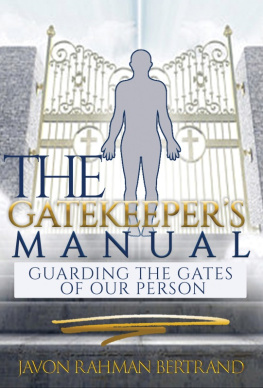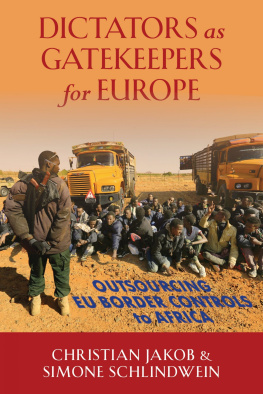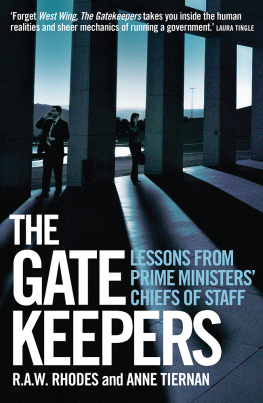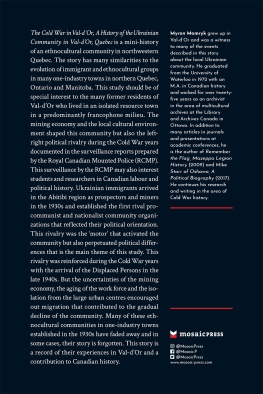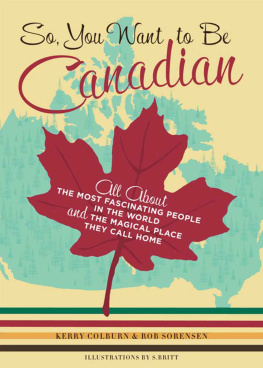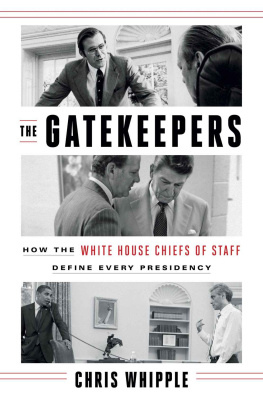Praise for
GATEKEEPERS
Iacovettas title Gatekeepers puts it just right because it tells us that the immigrants were to a large extent manipulated or managed into a pattern of conformity set by groups that wanted to Canadianize them in certain ways. Her text is replete with excellent examples of these kinds of top-down attempts to control the immigrants to make them fit in. Shes used everything I know about and lots more to provide a rich, scholarly, and compelling work.
Jerry Tulchinsky, History, Queens University
Iacovetta sheds light on the importance of ethnicity in the context of post-World War II immigration. Her comparison of the experiences of different ethnic groups makes an original contribution. She develops a valuable discussion of the dynamics of citizenship and nation-building from the perspectives of both gatekeepers and newcomers.
Frances Swyripa, History, University of Alberta
FRANCA IACOVETTA
GATEKEEPERS
Reshaping Immigrant Lives in Cold War Canada
BETWEEN THE LINES
TORONTO
Gatekeepers
2006 by Franca Iacovetta
First published in 2006 by
Between the Lines
401 Richmond Street West, Studio 277
Toronto Ontario M5V 3A8
Canada
1-800-718-7201
www.btlbooks.com
All rights reserved. No part of this publication may be photocopied, reproduced, stored in a retrieval system, or transmitted in any form or by any means, electronic, mechanical, recording, or otherwise, without the written permission of Between the Lines, or (for photocopying in Canada only) Access Copyright, 1 Yonge Street, Suite 1900, Toronto, Ontario, M5E 1E5.
Every reasonable effort has been made to identify copyright holders. Between the Lines would be pleased to have any errors or omissions brought to its attention.
Cataloguing data available from Library and Archives Canada
ISBN 978-1-926662-68-8 (epub)
ISBN 9781926662695 (PDF)
ISBN 9781897071113 (print)
Cover and text design by David Vereschagin, Quadrat Communications
Between the Lines gratefully acknowledges assistance for its publishing activities from the Canada Council for the Arts, the Ontario Arts Council, the Government of Ontario through the Ontario Book Publishers Tax Credit program and through the Ontario Book Initiative, and the Government of Canada through the Book Publishing Industry Development Program.
For my brother Dave
Contents
2 Press Narratives of Migration
From Scarcity and Red Slavery to Oranges and Humanity
3 Defining the Agenda
Professional Discourses of Integration and Citizenship
4 Institutional Gatekeepers
Democratic Pluralism or Ethnic Containment?
5 Tactics of Close Liaison
Political Gatekeepers, the Ethnic Press, and Anti-Communist Citizens
6 Culinary Containment?
Cooking for the Family, Democracy, and Nation
7 Shaping the Democratic Family
Popular Advice Experts and Settlement House Workers
8 From Newcomers to Dangerous Foreigners
Containing Deviant and Violent Men
9 The Sexual Politics of Survival and Citizenship
Social Workers, Damaged Women, and Canadas Moral Democracy
10 Guarding the Nations Security
On the Lookout for Femmes Fatales, Scam Artists, and Spies
11 Peace and Freedom in Their Steps
Preface and
Acknowledgements
AS A STUDY OF A TRANSFORMATIVE ERA in Canadian nation-building, this book aims to shed new light on connections between the political, social, gender, sexual, and immigrant history of early Cold War Canada and the politics of citizenship in a postwar capitalist democracy. I hope that I have conveyed something of the complex dynamics that shaped the many encounters between Canadian gatekeepers and European newcomers, and that I have provided readers with useful analytical tools and interpretations for understanding how postwar Canada became both a more decidedly multi-ethnic nation and a national security state. As a historian who appreciates the power of storytelling, I also hope that I have captured both a sense of the human drama that unfolded in these years and the mix of optimism, fear, and sense of urgency that marked the period.
Given the emphasis in Gatekeepers on controversial or unflattering features of postwar reception and citizenship work, and the critique of the modest and hypocritical form of cultural pluralism that developed in those years, it might seem odd that I begin my acknowledgements by noting the multicultural features of my own personal history. Yet by doing this I want to underscore the significant distinction between a state- and elite-driven policy of what would eventually be called multiculturalism, and the reality that many Canadians live multiracial lives and that they, like me, have found this experience to be enriching.
In addition to being the first Canadian-born, and eldest, daughter of six children born to now deceased Italian parents who came to Canada in the early 1950s, I, like all my siblings, partnered outside our culture. My large family now includes four sisters-in-law: one, the daughter of a Mohawk father and white mother, has official Native status; another is the adopted child of Polish Jewish survivors recruited from the displaced persons camps to work at Tip Top Tailors; and a third is an Easterner who grew up in a number of small towns in New Brunswick, Nova Scotia, and Prince Edward Island before her family headed down the road to Toronto. The family also includes an Irish-Catholic brother-in-law from Northern Ontario, my own partner, the son of an English immigrant father and Scottish-Canadian mother who grew up in an almost exclusively Wasp middle-class planned community. It includes his kind-hearted sister (my fourth sister-in-law) and a gang of nieces, nephews, and their various partners. While none of the children of the different unions can speak Italian, Yiddish, Irish Gaelic, or Mohawk, a multicultural world is what they know and value.
The same is true of the bright and energetic undergraduate students whom I have taught for the last decade and a half at the University of Torontos Scarborough campus, where the student body is more not-white than white. Teaching them has been an exciting and empowering experience. I have also greatly benefited personally, intellectually, and politically from working with a large and diverse group of brilliant Canadian graduate history students.
As this book makes abundantly clear, however, celebrations of multiculturalism, however defined, are not enough. As a left feminist anti-racist, I am not content with simplistic notions of liberal pluralism or self-congratulatory rhetoric about how, these days, everyone gets to join the ever-expansive Canadian family. We must also be prepared to fight racism in whatever form it takes and to challenge the grim realities of a Canada that, notwithstanding important accomplishments, remains in many respects a vertical mosaic in which privilege and opportunity still arise according to class-based, racist, and sexist, including heterosexist, criteria. While the backlash against multiculturalism, from both left-wing and conservative critics, reveals much misunderstanding, gross oversimplification (as in the misplaced assumption that anti-racist critics fall into the category of liberal multiculturalists), and muddled politics, my professional historical community remains overwhelmingly white so there is much work still to be done.


